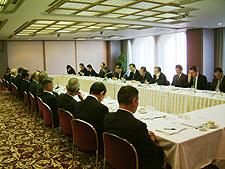On Jobs, Working Hours/Safety Controls, Social Security
(26 Dec 2003)
 |
| Photo: RENGO meeting with Nippon Keidanren at Keidanren Kaikan, Dec. 18. |
Regarding problems concerning employment, RENGO proposed at the meeting with Nippon Keidanren (JBF) joint labor-management activities for work-sharing issues in addition to exchanging opinions measures for those young people who have not yet received jobs.
Nippon Keidanren responded by saying that “while it is true that many businesses have seen an improvement through downsizing, this is also necessary to effectively utilize human resources and remain competitive. In the future, the challenge will be to increase jobs through technological innovations and advances in services, while including support measures for working women and foreign workers.” JBF expressed its stance on work-sharing by saying that “it is difficult to apply work-sharing to the current industries so this matter should be studied while considering the future labor shortage.”
When RENGO called on JBF by stating that “it is necessary to conclude a declaration eliminating unpaid overtime between RENGO and Nippon Keidanren,” JBF replied by stressing that “this should probably be handled by labor and management in individual companies. Instead, we should promote systems like that of a white-collar exemption (white-collar employees not controlled by working hour management) system from the point of view of ‘quality’ and not of ‘time.’”
Other matters that RENGO pointed out included the following: “One of the possible causes of the frequent fire and explosion accidents at businesses might be that corporate spending on factories equipment and safety controls is considered less seriously because of downsizing.” “We want labor and management to keep a close watch on the privatization of workers’ accident insurance.” “(The government) is mired in a fiscal debate of issues of social security system reform repeating its stance on reducing benefits and raising premiums/citizen’s burdens without holding to any real policy. In order to bring about any fundamental reform, what is necessary is to establish a bipartisan consultation organ and arrive at a conclusion in about a year.”
Chairman Okuda summarized the opinion exchange as follows. “(Nippon Keidanren) urges drastic reform of social security system because future anxiety over inadequacies in social security leads to slowdowns in spending.” “The problem of ‘Service Overwork’ (unpaid overtime) is also influenced by the housing conditions in that if workers want to take unfinished work home, they do not have studies or any place to use at home. Tax breaks for home loans are important.” “Shift work takes a great toll from a health point of view; we want to tackle employees’ health management problem.” He also stressed that “the report by the Keidanren’s Committee on Management and Labor Policy does not ask for a decrease in base pay but is only meant to point to its possibility as part of labor/management consultations.”
President Sasamori strongly appealed about the report by saying, “RENGO has decided by consensus not to demand a universal base-wage hike from two years ago and management should not impose it.”
On pension system reform Sasamori stated that “it is necessary to connect (the start of) pension payments and (termination of) employment. Although there are disagreements over details, we want to confront politics and administration hand in hand (with management).” Finally, he called on attendees telling them that “rolling the jobless rate back to 4% now is crucial. Let labor and management cooperate on employment measures such as work-sharing.” Afterward, he ended the meeting.